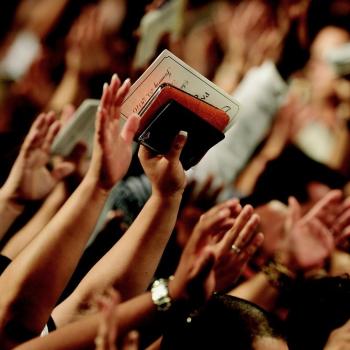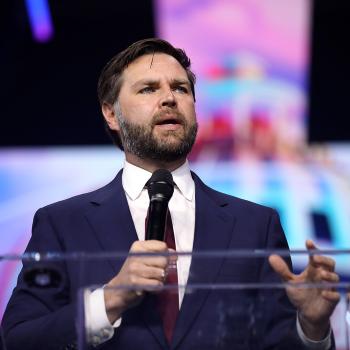Hamas’s October 7 attack on Israel led to the deaths of over 1,200 people, mostly Israeli civilians. Immediately after, Israel declared war on Gaza. The war has since killed over 39,000 Palestinians, according to the Gaza Health Ministry. Back in March, UNICEF has said that Israel had killed over 13,000 children. These numbers, which obscure the lives and losses behind them, are conservative estimates. Academics Rasha Khatib, Martin McKee, and Salim Yusuf have recently argued that Palestinian deaths attributable to Israel’s violence reach as far as 186,000.
As Khatib et al. write, “The total death toll is expected to be large given the intensity of this conflict; destroyed health-care infrastructure; severe shortages of food, water, and shelter; the population’s inability to flee to safe places; and the loss of funding to UNRWA, one of the very few humanitarian organisations still active in the Gaza Strip.”
The mass Palestinian death and suffering has led many around the world to question whether Israel is truly exercising its right to self-defense and if Israel is really the victim in this situation. This wave of skepticism has affected even the evangelical world, particularly young evangelicals.
Younger Evangelicals and Israel
In 2017, LifeWay Research published a report that showed that evangelicals under 35 were considerably less likely than older evangelicals to support Israel. Pasted below are tables created by the LifeWay team that show how evangelicals, divided by age cohort, differ on their stance on Israel.
Younger Evangelicals’ View of Israel
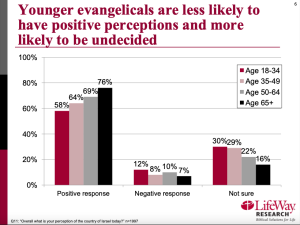
Younger Evangelicals and Israel as an Injustice
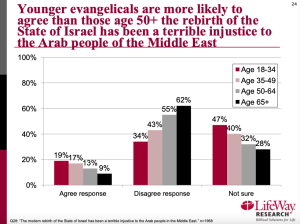
Younger Evangelicals and Palestinians
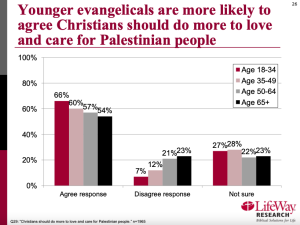
Why the Age Difference?
Many reasons have been proposed to explain why younger evangelicals are less likely to support Israel, and why they feel more liberty to criticize it. Older evangelicals often blame it on younger generations not reading the Bible as much as they do, or on skipping church.
However, as Motti Inbari and Kirill M. Bumin find in their survey, younger evangelicals are not less religious than older generations in terms of Bible reading and church attendance. In fact, low church attendance is much more common among older generations than for evangelicals aged 18-29. Rather, younger evangelicals have different notions of justice and more positive views of non-Christians (including Muslims) than older evangelicals do. Unlike older evangelicals, who lean politically rightward, younger respondents are commonly politically moderate. Yet, this last piece of data seems insufficient to account for the skepticism of Israel, since support for Israel is not a conservative thing, but an across-the-board American position.
Whereas older evangelicals were likely to support Israel due to beliefs that doing so fulfills prophesies pertaining to Christ’s return and perceiving cultural and religious similarities between Christians and Israeli Jews, younger evangelicals are immersed in the same theological environments but are less affected and more critical towards Israel. Inbari and Bumin suggest that the difference is more ideologically than religious, even though theology plays a key role in motivating support for Israel.
We must remember that this trend among younger evangelicals is by no means new. Younger evangelicals have been wavering in their support for Israel, as documented in the LifeWay report in 2017.
Where Do We Go From Here?
If you find yourself in that same camp in the evangelical world, even if you are above or below the 18-34 age range, you are welcome here. As the horrors of Israel’s attack on Gaza unfold, more and more Christians who were raised on support for Israel are asking the same questions.
How many more Palestinian deaths will be enough to satiate Israel’s desire for revenge? Is Hamas really using its people as human shields, or are there deeper and more dangerous powers at play? Does the Bible really require us to support Israel, no matter what? And how did so many evangelicals become supporters, anyways?
These questions and more will be explored in the coming articles. The time is short, but the time is right to start reckoning with the theology we have been fed. It is time to take up our cross, for there are bombs raining down from the sky.
References
Inbari, Motti, Kirill M. Bumin, and M. Gordon Byrd. “Why Do Evangelicals Support Israel?.” Politics and Religion 14, no. 1 (2021): 1-36.
Khatib, Rasha, Martin McKee, and Salim Yusuf. “Counting the Dead in Gaza: Difficult But Essential.” The Lancet 404, no. 10449 (2024): 237-238.
Rosenberg, Joel C., and Chosen People Ministries. “Evangelical Attitudes Toward Israel Research Study.” (2017).




